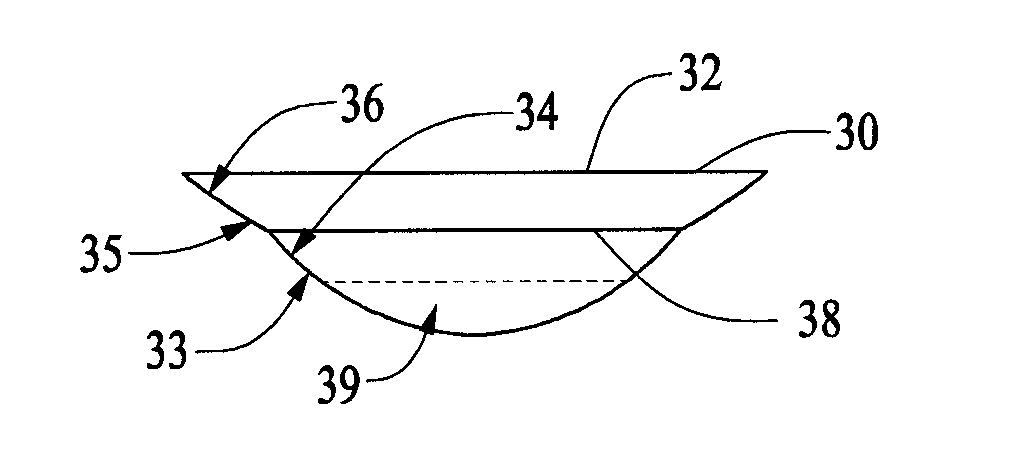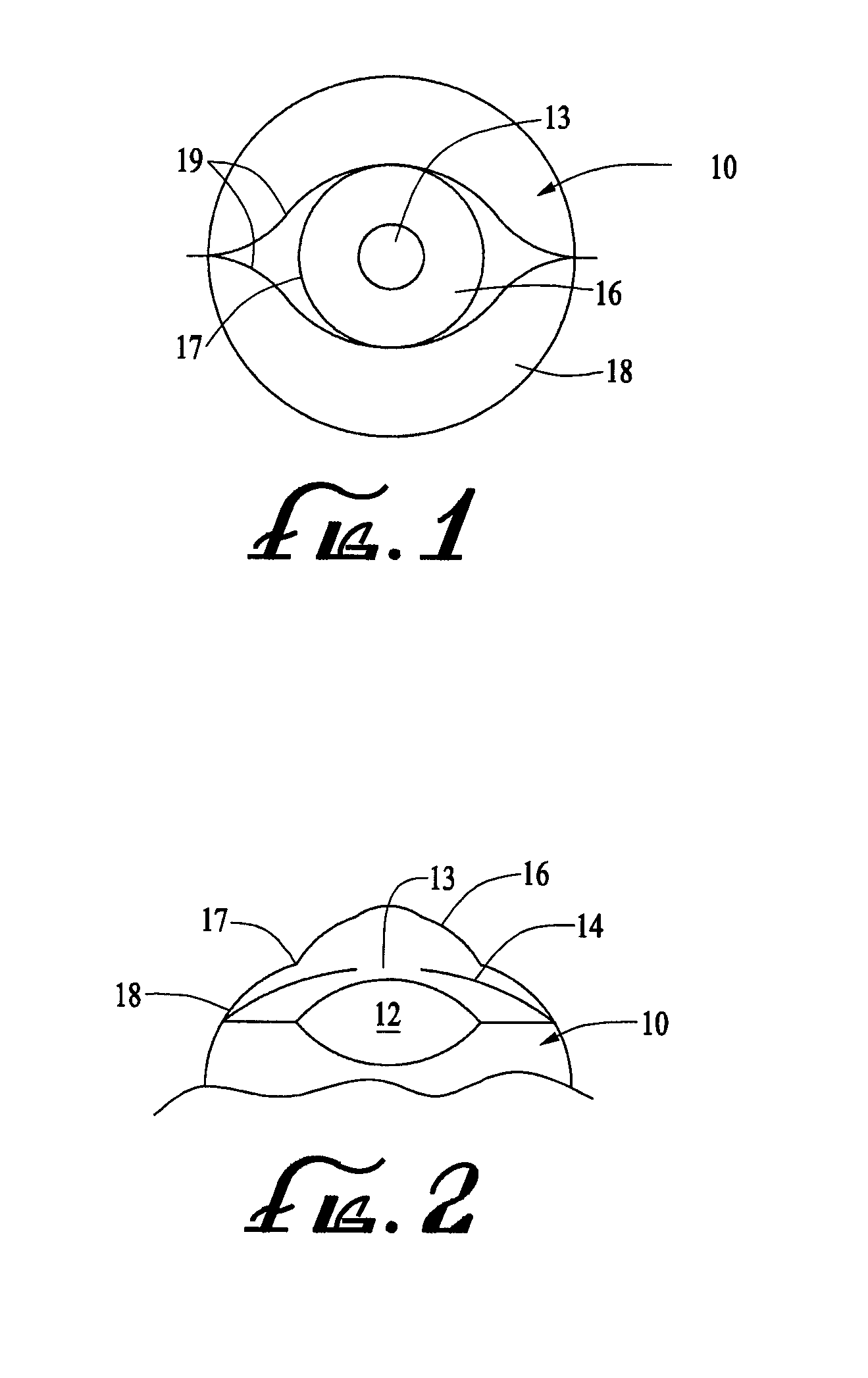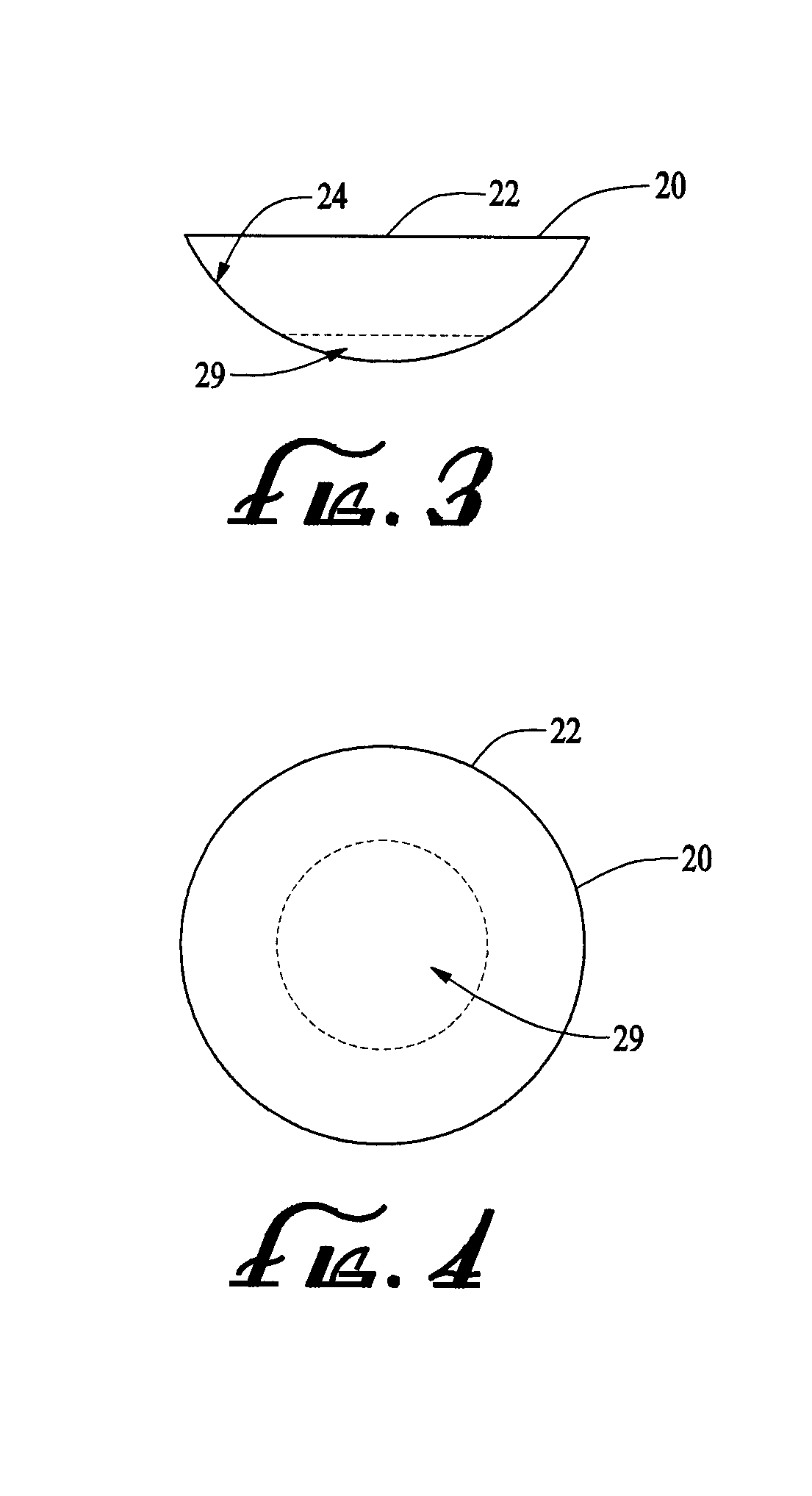Ring shaped contoured collagen shield for ophthalmic drug delivery
a contoured collagen and ophthalmic technology, applied in the field of ring-shaped contoured collagen shields for ophthalmic drug delivery, can solve the problems of loss of transparency, loss of collagen shields, patient is not able to perform normal activities such as driving or reading, and achieves the effect of increasing the coverage of the eye and stable retention of the shield on the ey
- Summary
- Abstract
- Description
- Claims
- Application Information
AI Technical Summary
Benefits of technology
Problems solved by technology
Method used
Image
Examples
first embodiment
[0029]Referring to FIGS. 3 and 4, the device described herein is shown. The collagen shield 20 has a single-radius base curve 24 sized to fit on the eye and cover the cornea and a portion of the scleral region of the eye. The radius of curvature of the base curve is approximately 10 mm, which is larger than the typical corneal radius of curvature of 7.7 mm and smaller than the typical scleral radius of curvature of 13.5 mm. The outer edge 22 of the collagen shield has a circular configuration with an outer diameter of approximately 17-18 mm. When placed on the eye, this collagen shield will loosely fit over the cornea and limbal regions of the eye and stabilize where the outer edge 22 of the shield contacts the scleral portion of the eye. The central corneal portion 29 of the shield, which decomposes shortly after the shield is placed on the eye, has a diameter of approximately 8-9 mm.
second embodiment
[0030]Referring to FIGS. 5 and 6, the device described herein is shown. The collagen shield 30 has a dual-radii base curve with the different radii meeting in a limbal ring 38 around the shield. The scleral portion 35 of the shield has a base curve radius 36 of approximately 12.7 mm to match the radius of curvature of the scleral portion of the eye; the corneal portion 33 of the shield has a base curve radius 34 of approximately 7.7 mm to match the radius of curvature of the corneal portion of the eye. The dual base curves forming the inside curvature of the shield are designed to meet and form a limbal ring 38 around the shield. The limbal ring 38 provides an additional mechanism to keep the collagen shield centered on the eye. The diameter of the limbal ring 38 on the shield is approximately 12-13 mm which matches the limbal diameter of the cornea. The outer edge 32 of the collagen shield has a circular configuration with an outer diameter of approximately 17-18 mm. The scleral po...
third embodiment
[0031]Referring to FIGS. 7 and 8, the device described herein is shown. The collagen shield 40 has a multi-radii base curve typical of the base curve used for commercially available collagen corneal shields. The multi-radii base curve is made up of several radii of curvature. The central radius of curvature 44 is flat, the next radius of curvature 45 is 10.7 mm, the third radius of curvature 46 is 5 mm, and the fourth radius of curvature 47 is 12.7 mm which matches the radius of curvature of the scleral portion of the eye. When placed on the eye, this collagen shield will loosely fit over the cornea and stabilize on the scleral portion of the eye. The outer edge 42 of the collagen shield has a circular configuration with an outer diameter of approximately 17-18 mm. The scleral portion 35 of the base curve has a radius of curvature 47 slightly smaller than the typical radius of curvature of the scleral portion of the eye so that the outer edge 42 of the collagen shield tightly fit ag...
PUM
| Property | Measurement | Unit |
|---|---|---|
| radius | aaaaa | aaaaa |
| radius | aaaaa | aaaaa |
| diameter | aaaaa | aaaaa |
Abstract
Description
Claims
Application Information
 Login to View More
Login to View More - R&D
- Intellectual Property
- Life Sciences
- Materials
- Tech Scout
- Unparalleled Data Quality
- Higher Quality Content
- 60% Fewer Hallucinations
Browse by: Latest US Patents, China's latest patents, Technical Efficacy Thesaurus, Application Domain, Technology Topic, Popular Technical Reports.
© 2025 PatSnap. All rights reserved.Legal|Privacy policy|Modern Slavery Act Transparency Statement|Sitemap|About US| Contact US: help@patsnap.com



